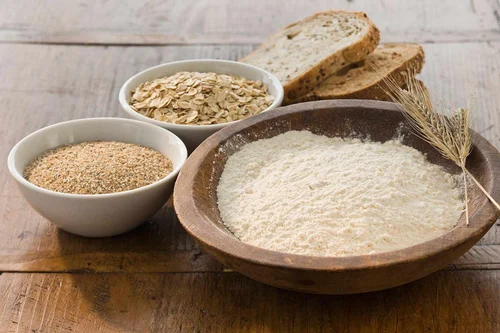Wheat Bread Flour
₹37.0
| Packaging Type | Loose |
| Best Before | 3 Months |
| Usage/Application | Bread |
| Speciality | High in Protein |
| Hybrid | Yes |
| Color | White |
You must be logged in to post a review.
Q & A
Organic products are generally considered more sustainable than conventional products in several ways. Here are some key factors that contribute to their sustainability:
Environmental Impact: Organic farming practices prioritize the use of natural fertilizers and biological pest control methods, reducing reliance on synthetic pesticides and chemical fertilizers. This approach helps protect soil health, water quality, and biodiversity. Organic farming also promotes crop rotation and the use of cover crops to maintain soil fertility and prevent erosion.
Reduced Chemical Exposure: Organic products are produced without the use of synthetic pesticides, herbicides, and genetically modified organisms (GMOs). This reduces chemical residues in food and minimizes the potential health risks associated with prolonged exposure to these substances.
Conservation of Resources: Organic farming techniques aim to minimize resource consumption and waste. Practices such as composting, water conservation, and energy efficiency help reduce the environmental footprint of organic production.
Animal Welfare: Organic animal farming standards prioritize the welfare of animals. Livestock are raised in more natural and humane conditions, with access to outdoor areas and a requirement for organic feed. This approach supports healthier and more ethical treatment of animals.
Long-Term Sustainability: Organic farming methods prioritize soil health and long-term sustainability. By focusing on building healthy soils through organic matter, crop rotation, and other practices, organic farming aims to maintain productivity over the long term and reduce reliance on external inputs.
However, it's important to note that organic farming is not without challenges. Organic yields are often lower than those of conventional farming, which can lead to higher land requirements to produce the same amount of food. Transportation and distribution logistics for organic products can also pose environmental challenges if they involve long-distance travel.
Furthermore, it's essential to consider the overall sustainability of organic products within the larger food system. Factors such as packaging, processing methods, and distribution networks can influence the overall environmental impact and sustainability of organic products.
In summary, organic products generally offer several sustainability benefits compared to conventional products, including reduced chemical exposure, environmental conservation, and improved animal welfare. However, it's crucial to consider the broader context and evaluate the complete life cycle of organic products to make informed decisions about their sustainability.
General Inquiries
There are no inquiries yet.





Reviews
There are no reviews yet.